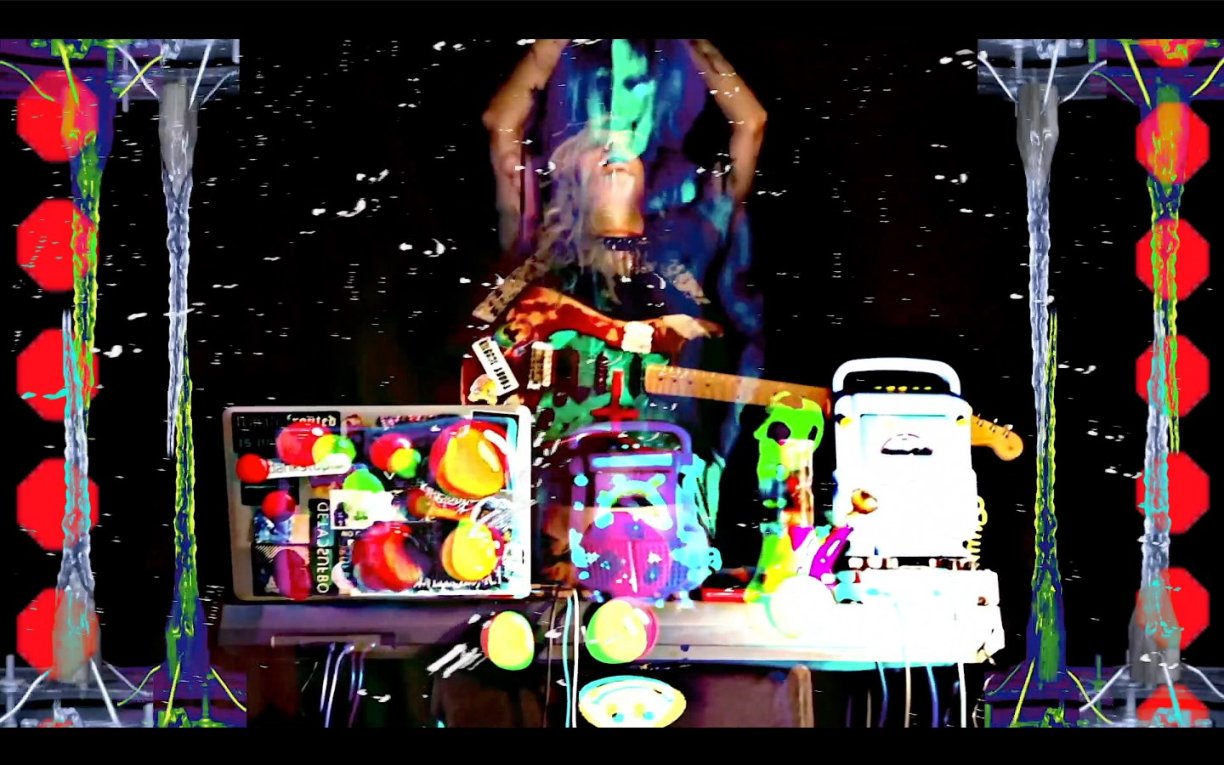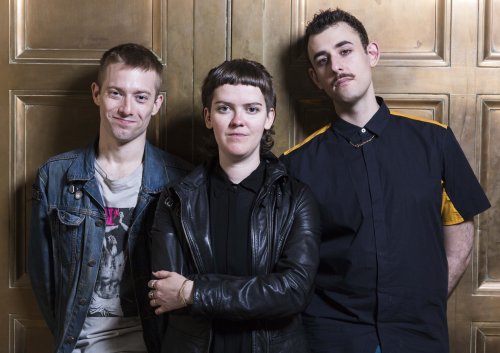For their final program as the 2018 Suzanne Fiol Curatorial Fellow, Queer Trash is excited to present God Is My Co-Pilot and Fire-Toolz. Angular and ecstatic, the program promises an evening of raw and experimental song form, reconstructed noise, and genre promiscuity. Queer Trash strives for high refinement and low restraint.
Formed in New York in 1988, God is my Co-Pilot pioneered queercore before the term existed. Evading easy definition, their sound careens through no wave, thrash, free improv, and whatever else. Their influence on a generation of freaks is immeasurable, true legends of the underground. With biting humour, their lyrics cut across body politics, religious idealism, and sexist stereotypes.
Angel Marcloid's Fire-Toolz is a frenzied digital video collage and music project overflowing with genres: electro-industrial, harsh noise, trip metal, heavy dance, vaporwave, and more. Rendering the personal and digital inseparable, Fire-Toolz transforms decades of internet aesthetics into a lexicon of swirling iconography, where recurring symbols and sounds create a world of recursive transformation.
Art historian Amelia Jones writes, “Queer rides that line of needing to be identified as not identifiable.” From moment to moment, whether taking cues from rock or pop, electronica or jazz, God is my Co-Pilot and Fire-Toolz are as intentional as they are indescribable. The final program of the 2018 Suzanne Fiol Curatorial Fellowship is a bombardment of queer complexity, discomfort distilled from the familiar, assemblages of sounds, excessive, personal, stolen, exploded, fucking weird, sincere, meticulously crafted, unruly, and over-the-top fabulous.
At ISSUE Project Room, the God Is My Co-Pilot lineup consists of Normandy Sherwood (vocals and eurorack), Craig Flanagin (guitar), Rachel Swaner (electronics), Hajnal K Pivnick (violin), Jason Blackkat (bass), and Kevin Shea (drums). Since 1988, GodCo has never been easy to pin down. They'd play short sharp thrash sets one night, noisy improv the next. Their music swallowed elements of Balkan, Punk, Noise, Jump-Rope Rhymes, Finnish folk, Surf, Krautrock, and Rembetika. They've been described as "Crass meets the B-52s" and "A kindergarten music class being thrown down the stairs." They booked and played the first ABC No Rio hardcore matinee, where they were deemed "too punk for jazz, too jazz for punk." In their first year of gigs, they played an average of 1 show every 8.2 days. In the next five years, they slacked off a little, averaging only a show every 8.5 days. Following the 1998 album "Get Busy", members gradually scattered to the round earth's imagined corners (Sweden, Scotland, Switzerland, P-Town, upstate New York), and the group met together only in Europe for tours. Since their recent return to playing shows in New York (at the instigation of drummer Kevin Shea), they've played twenty-five gigs in twenty-five weeks. This average is left as an exercise for the reader. Prolific and restless, they have always operated as a core group of four or five, with a wide range of invited friends: Catherine Jauniaux, Yoshimi, Weasel Walter, Chan Marshall, Anthony Coleman, Ann Rupel, Richie Stotts, Kate Gentile, Marion Coutts, Jad Fair, Mags Fiedler, Samara Lubelski, Syd Straw, Kenny Wollesen, Taavi Lahtinen. Frank London. To name just 16. They've recorded five BBC Peel Sessions. They've played Roskilde, the largest festival in Europe, twice. In fact, they've played in over thirty countries. They've done a Cobra. They've toured with Dog Faced Hermans, Fugazi, Melt Banana, Dawson. They put out the first Cat Power single on their record label. GodCo was Queer as Fuck before the word "queercore" existed, when it was still "fabulous" instead of "accepted," when it was actively dangerous to be queer. GodCo never came out of the closet because they were never in.
Fire-Toolz is one musical moniker used by a consciousness that has taken the physical form of a transfemme non-binary human named Angel Marcloid. While her other projects focus on extended noise texture or experiments in sample manipulation, Fire-Toolz has come to host some of her most complex and expressive compositions to date, characterized by multi-aesthetic overload and labyrinthine progressive songwriting. Though her work fits under the wide umbrella of beat-focused electronic production, she sculpts her combinatory tracks from warped signifiers of genres including jazz fusion, electro-industrial, new age, black metal, vaporwave, and noise improv. Fire-Toolz's music takes on its own chimeric character both reminiscent in the hyper-specificity of its mangled tropes and alien in its tightly structured composite. Her sound design teems with networks of intricate details and stereo spatialization decisions that render each unpredictable juxtaposition and sudden change in mood at a level of high definition just as fit for close listening on headphones as on a room-shaking theater soundsystem. Far from indulging in sterile experiments in production, Marcloid herself shines (or self-immolates) at the center of her project with searing lead vocals that flit between screams, croons, barks, and whispers. Her lyrics from album to album chart a progression from a preoccupation with trauma and obsession, through considerations of personal spirituality and secular knowledge of consciousness, into prismatic memories of her childhood, her dreams, and her relationship with the natural world. In the live setting, Marcloid couples her performances for vocals, guitars, and electronics with her own collage-like program of videos, densely edited and blasted through effects into a dizzyingly fluctuating backdrop that complicates and compounds the themes presented in her music. Like an exaggerated dystopian version of the eclectic listener who finds joy in juxtaposing genres or moods while building a playlist, Fire-Toolz makes room within the context of one project for endless recombination and fragmentation beyond any constraints - all to give us some inkling, however small it may be, of what lies at her core. Her catalog includes Even The Files Won't Touch You released on Depravity Label in 2016, Drip Mental released on Hausu Mountain in 2017, and INTERBEING released on Bedlam Tapes in 2017. Her first full-length LP, SKINLESS X-1, arrives on Hausu Mountain in 2018.
Queer Trash was founded by Michael Foster and Richard Kamerman in spring 2016. Active participants in experimental music scenes in New York City, Foster and Kamerman created Queer Trash in response to a lack of a dedicated queer platform within their communities. Queer Trash has hosted eight events at seven different locations throughout New York City, presenting both local and touring artists from as far as Mexico and Sweden working across experimental aesthetics and practices. A participant in the fifth Queer Trash, Eames Armstrong joined Queer Trash in July 2017 as the third curator of the series after six years of organizing visual and performance art in Washington, DC.



